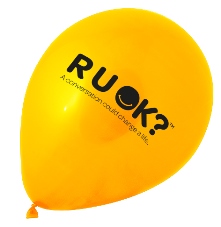Sometimes we might think a person around us is acting differently than usual or perhaps you have noticed some changes in yourself?
It is quite common for people to ignore these signs, unless someone reaches out and specifically asks for help. R U OK day promoted on the 10th of September every year, encourages people not to ignore these signs and teaches us how we can make a positive impact in someone else’s life. It’s amazing how a simple question “Are you okay” can make a big difference and perhaps even save a life.
Is there someone you are worried about, but are not sure how to ask? Below are some tips to help you, help someone else.
- Pick your moment. Only start a conversation when your mind is clear and you are ready and willing to listen. Make sure you can give as much time as possible, this could be a two minute conversation or it could last an hour!
- Be prepared for the conversation you are trying to start. You need to understand that the conversation could be extremely difficult and sometimes you won’t have the answers to every problem. Sometimes the person you are trying to help can become emotional and react foolishly or angrily, but remember you are trying to help them (it’s worth it!).
- Start the discussion. It can be difficult to know how to prompt this discussion. An opening line such as “how is your day going” or “I have noticed you seem tired lately, is there a problem?” is the perfect way to start this conversation.
- Ask the question! If you feel like the person in question is opening up and the mood is stable, now would be the perfect time for you to ask them “are you okay?”
- Listen without interrupting and without judgement. Take their problems seriously, remember that what you think is significant may be different to what another person thinks. Encourage them to explain and let them know you are listening. This can be done by something as simple as a nod of your head or verbally “you sound very stressed, how long has this been going on?”
- Improve the situation. What can you do to help make their situation better? Perhaps getting their mind off the topic by having some fun could help. Maybe you have a few ideas you yourself have found useful, sometimes even just talking about the situation and providing support is enough.
- Remember genuine concern and care can make a real difference, so keep in contact with the person and follow up your discussion. Have they found a better way to deal with the situation? How are they doing? Maybe now is the time to offer the option of professional help, perhaps a psychologist. Remain optimistic and encourage them to do the same, continue to show that there are people to who care enough to give their support and who are willing to listen.
If you believe you cannot help and the situation is getting out of hand, professionals such as an experienced psychologist may be able to assist. Having someone who has dealt with similar problems before and is knowledgeable about managing the situation and treatments can be beneficial for everyone involved. If you live in the Geelong region, Health e Allied has an qualified psychologist Mr Sergio Giurina who is experienced with Adults, Children and Adolescent’s.
If you or the person in questions would like to remain anonymous, you can call crisis support services such as Lifeline for confidential support and advice. If you think that someone’s life is in immediate danger call 000 and stay with them until help arrives.
For more information regarding “R U OK day” please go to the foundations website at www.ruok.org.au.
Information found at www.ruok.org.au.

